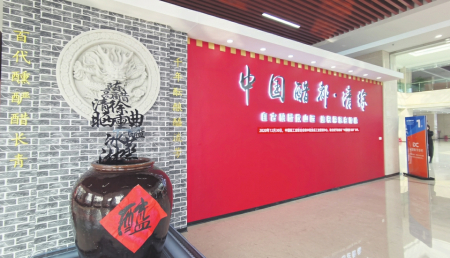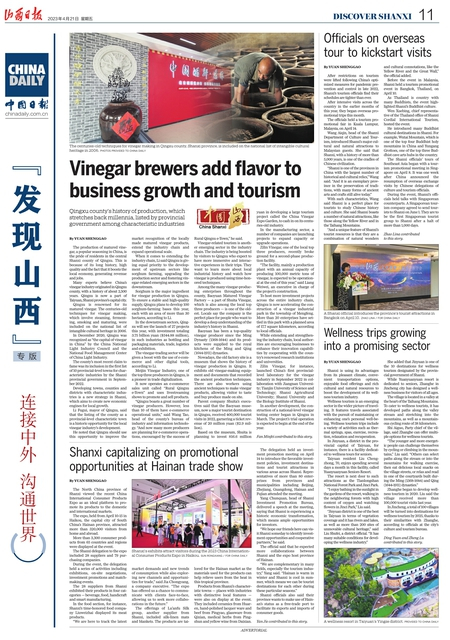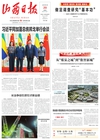Vinegar brewers add flavor to business growth and tourism

The centuries-old techniques for vinegar making in Qingxu county, Shanxi province, is included on the national list of intangible cultural heritage in 2006. Photos provided to China Daily
Qingxu county’s history of production, which stretches back millennia, listed by provincial government among characteristic industries
The production of matured vinegar, a popular seasoning in China, is the pride of residents in the central Shanxi county of Qingxu. This is because of its long history, high quality and the fact that it boosts the local economy, generating revenue and jobs.
Many experts believe China's vinegar industry originated in Qingxu county, with a history of about 2,500 years. Qingxu is now a part of Taiyuan, Shanxi province's capital city.
Qingxu is renowned for its matured vinegar. The centuries-old techniques for vinegar making, which involve steaming, fermenting, smoking and maturing, were included on the national list of intangible cultural heritage in 2006.
In December 2020, Qingxu was recognized as "the capital of vinegar in China" by the China National Light Industry Council and the National Food Management Center of China Light Industry.
The county's most recent claim to fame was its inclusion in the first list of 10 provincial-level towns for characteristic industries by the Shanxi provincial government in September 2022.
Developing towns, counties and districts with characteristic industries is a new strategy in Shanxi, which aims to create new economic engines for local growth.
Li Fugui, mayor of Qingxu, said that the listing of the county as a provincial-level characteristic town is a historic opportunity for the local vinegar industry's development.
He noted that Qingxu should use this opportunity to improve the market recognition of locally made matured vinegar products, extend the industry chain and expand operational scale.
When it comes to extending the industry chain, Li said Qingxu is giving equal priority to the development of upstream sectors like sorghum farming, upgrading the production sector and fostering vinegar-related emerging sectors in the downstream.
Sorghum is the major ingredient for vinegar production in Qingxu. To ensure a stable and high-quality supply, Qingxu plans to develop 100 sorghum-farming bases this year, each with an area of more than 30 hectares, according to Li.
In the downstream sectors, Qingxu will see the launch of 27 projects this year, with investment totaling 3.75 billion yuan ($544.88 million), in such industries as bottling and packaging materials, trade, logistics and exhibition.
The vinegar-trading sector will be given a boost with the use of e-commerce and other digital tools, according to Li.
Meijin Vinegar Industry, one of the top three producers in Qingxu, is a pioneer in trade digitalization.
It now operates an e-commerce sales unit called "Rural Qingxu e-Town" and uses livestreaming shows to promote and sell products.
"Qingxu boasts a great number of vinegar producers. However, less than 10 of them have e-commerce operational units," said Wang Tao, head of the county's bureau of industry and information technology. "And now many more producers are planning for e-commerce operations, encouraged by the success of Rural Qingxu e-Town," he said.
Vinegar-related tourism is another emerging sector in the industry chain. The industry is being boosted by visitors to Qingxu who expect to have more immersive and interactive experiences during their trips. They want to learn more about local industrial history and watch how vinegar is produced using time-honored techniques.
Among the many vinegar-producing enterprises throughout the county, Baoyuan Matured Vinegar Factory — a part of Shuita Vinegar, which is also among the local top three producers — is one of the oldest. Locals say the company is the perfect place for people who want to develop a deep understanding of the industry's history in Shanxi.
Baoyuan has been a top-quality vinegar producer since the Ming Dynasty (1368-1644) and its products were supplied to the royal kitchens of the Ming and Qing (1644-1911) dynasties.
Nowadays, the old factory site is a museum that shows the history of vinegar production in Qingxu. It exhibits old vinegar-making equipment and documents that recorded the ancient production techniques. There are also workers using ancient techniques to make vinegar products, allowing visitors to taste and buy produce made on-site.
Parent company Shuita's executives said that the Baoyuan museum, now a major tourist destination in Qingxu, received 400,000 tourist visits in 2022, garnering a ticket revenue of 20 million yuan ($2.9 million).
Based on the museum, Shuita is planning to invest 816.6 million yuan in developing a large tourism project called the China Vinegar Expo Garden, to cash in on its centuries-old industry.
In the manufacturing sector, a number of companies are launching projects to expand capacity or upgrade operations.
Zilin Vinegar, one of the local top three producers, recently broke ground for a second-phase production facility.
"The facility, mainly a production plant with an annual capacity of producing 100,000 metric tons of vinegar, is expected to be operational at the end of this year," said Liang Weiwei, an executive in charge of the project's construction.
To host more investment projects across the entire industry chain, Qingxu is now accelerating the construction of a vinegar industrial park in the township of Mengfeng. More than 20 enterprises have settled in this park with a planned area of 17.7 square kilometers, according to local officials.
While extending and strengthening the industry chain, local authorities are encouraging businesses to enhance their innovation capabilities by cooperating with the country's renowned research institutions and universities.
Zilin Vinegar, for instance, launched China's first provincial-level laboratory for the vinegar industry in September 2022 in collaboration with Jiangnan University, Tianjin University of Science and Technology, Shanxi Agricultural University, Shanxi University and the Biology Institute of Shanxi.
In another development, the construction of a national-level vinegar testing center began in Qingxu in March. Its trial operation is expected to begin at the end of the year.
Fan Minfei contributed to this story.
By Yuan Shenggao











